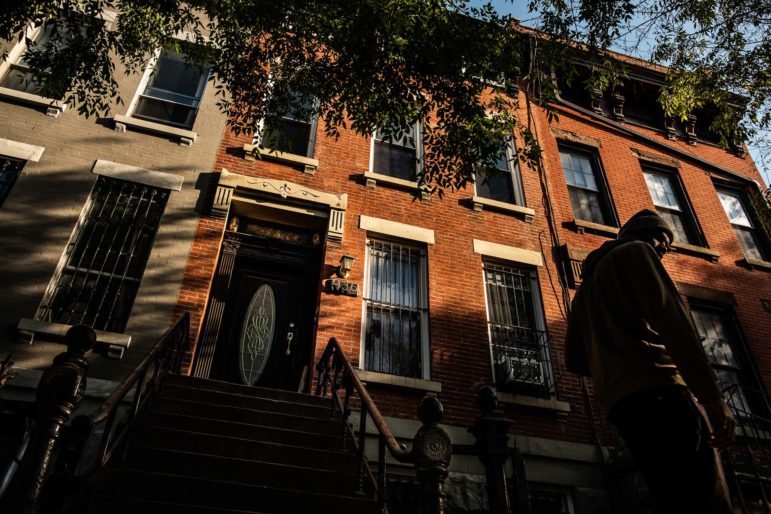Of the eight top Democratic contenders facing off in the June mayoral primary, six own homes within the five boroughs. Of those, two are landlords. Two other candidates rent their city residences.

Adi Talwar
Eric Adams’ property on Lafayette Avenue in Brooklyn.Alex Cintron has never met the man who owns the brownstone next door to her in Bedford Stuyvesant. She said she’s never even heard of her neighbor, who happens to be the Brooklyn Borough President and, quite possibly, the next mayor.
“I don’t know who Eric Adams is,” Cintron said as she returned home from work May 13.
She stopped on the steps outside her Lafayette Avenue apartment to look Adams up online, just to be sure. “No, never seen him before,” she confirmed.
Adams, she learned, is one of the favorites to become the next mayor, but he hasn’t made much of an impression on his neighbors. Maybe it’s because he spent a chunk of 2020 sleeping on the floor of his office in Brooklyn Borough Hall.
The Brooklyn Beep isn’t the only property owner running to run New York City: Of the eight top Democratic contenders facing off in the June mayoral primary, six own homes within the five boroughs. Two of those—Adams and former nonprofit executive Dianne Morales—are also landlords, renting out a unit to tenants. Both Comptroller Scott Stringer and entrepreneur Andrew Yang rent their city residences, though Yang also owns a home in the Hudson Valley.
Unlike current Mayor Bill de Blasio, who is also a landlord and was well-known around his Park Slope neighborhood before decamping to Gracie Mansion in 2013, some of the current mayoral hopefuls appear to keep a lower profile on their blocks. City Limits talked with 15 people living in or visiting buildings near Adams’ 936 Lafayette Ave. brownstone during visits to the block May 7 and 13. Only two knew Adams was a candidate for mayor and only one was aware that the cop-turned-politician lives in the building they walk by each day.
Notably, not a single person interviewed said they knew who they were voting for in the June 22 primary, though Cintron saw a potential upside to an Adams victory.
“If he wins, I hope his building would reflect the entire block,” she said, gesturing to the somewhat tidier steps and sidewalk outside Adams’ property.
Annie Armstrong has lived next door for nearly three years and said she’s never heard of Adams. She isn’t registered to vote, but also said living next door could have its benefits.
“I could go over there and tell him when he’s messing up,” she said.
Others were more skeptical of the moderate former Republican.
“Eric Adams owns that building?” said Shyan Zakeri, who lives two houses down. “It doesn’t change anything for me. I’ve never thought of voting for him.”
Zakeri, 24, said he plans to vote for a more progressive candidate — he’s not sure who — but cherished his new piece of trivia.
“It’s a fun tidbit I can tell people now,” he said.
The neighborhood has changed significantly since Adams purchased the four-unit building, with carved wooden masks and a stained glass window above the entrance, for just over $250,000 in 2003. Similar buildings in the neighborhood are selling for about 10 times that amount.
The block was once a predominantly Black community, but demographics have shifted over the past several years. All but two of the neighbors interviewed for this story were young, relatively recent arrivals to Bed Stuy. Many were white — the kind of Brooklyn transplants, perhaps, that Adams says should “go back to Iowa.”
“That goes to show you how times have changed,” said a man working in a parking lot across the street from Adams’ building. The man, who is Black, declined to share his name, but talked at length about the community. He said he is 61 and grew up in the building Adams now owns before his mother sold it in the 1980s.
Only three families from his childhood remain on the block, he said.
“Gentrification is taking over,” he added. “But people are going to live where they can afford.”
Adams has framed himself as a model landlord on the campaign trail.
“I own a four-family apartment and my tenants have never had their rents increased in over 12 years,” he said at a housing forum hosted by WBAI in February.
Adams’ campaign said he now rents out one unit but declined to say how much he charges per month.
“Some of his tenants have fallen on hard times,” a spokesperson said. “Eric’s apartment building is his home; his goal is not to make as much money off of it as he can.”
No one answered the door to confirm those claims when City Limits visited this month. They haven’t responded to handwritten messages left at the front door or at the entrance to a ground-level apartment under the stairs, where a mailbox was stuffed with letters and other materials — including a flyer for mayoral candidate Maya Wiley. On both visits, the apartment buzzers were covered with black tape and the same package, addressed to a resident in a neighboring apartment, was propped against the door frame.
Mandatory disclosure forms show Adams has earned steady revenue from the building. He collected somewhere between $5,000 and $49,999 in rental income in 2019, according to his most recent disclosure report filed last year with the city’s Conflict of Interests Board (COIB). The ethics agency allows candidates and officeholders to indicate their incomes in broad ranges. The form also shows that Adams owns a co-op in Fort Lee, NJ.
His 2012 disclosure form with the state’s Joint Commission on Public Ethics, or JCOPE, lists his rental income at between $20,000 and $50,000 for the Lafayette Avenue property. He held a seat in the state senate at the time of the filing.
Adams faced criticism in January after the Daily News reported that he has failed to file with the city’s Department of Housing Preservation and Development, which publishes violation information, since 2009. That makes it nearly impossible to check for complaints from building tenants, though the News noted that the building has racked up 14 Sanitation Department violations.
Five other top candidates also own properties in New York City, according to building records.
Wall Street executive Ray McGuire owns a duplex in the iconic San Remo, the twin-steepled complex overlooking Central Park from the edge of the Upper West Side. Former Housing and Urban Development Secretary Shaun Donovan has a carriage house in Boerum Hill, which he and his wife purchased for $2.3 million in 2019.
Donovan said he has no tenants, per se.
“I am considering charging my son and his friends for often taking over our living room for band practice,” he said.
Former Sanitation Commissioner Kathryn Garcia owns a two-story attached home in Park Slope and attorney Maya Wiley, the former counsel to Mayor de Blasio, has a stately house in the Prospect Park South section of Flatbush.
And veteran nonprofit executive Morales owns a three-story townhome in Bedford Stuyvesant, about a mile southwest of Adam’s brownstone. She made $24,000 renting out one unit in the building in 2019, according to tax records reported by Politico.
Campaign spokesperson Lauren Liles said Morales’ tenant has rented the unit for more than 10 years. “They are close personal friends now, to the point where he gets invited to Thanksgiving dinner every year,” Liles said.
The first floor is decorated with posters for her campaign, but neighbors said they had no idea a candidate was living around the corner.
“I’ll have to look her up,” said Melissa Johnson, as she passed by with her daughter.
Andrea Mason, an architect, was walking her dog past the house on debate night when she learned Morales lived there. She said she remains undecided, but liked what she heard from the leftwing candidate.
“I heard her opening line and it did pique my interest,” Mason said. “We need someone progressive after the pandemic.”
Two other candidates rent their New York City dwellings.
Yang, an entrepreneur who previously ran in the Democratic primary for president,lives in a two-bedroom apartment in a Hell’s Kitchen luxury building.
“I’m one of the two-thirds of New York City residents that are renting,” Yang proclaimed during that WBAI forum in February.
Still, most of those New York City renters don’t own a second home in New Paltz, where the Yang family hunkered down in the early days of the pandemic, or belong to a church in the Hudson Valley. He made $43,794 by renting out the New Paltz home for 58 days in 2019, Politico reported.
That makes Stringer the lone tenant among the top-tier candidates in the race for mayor.
He explained his decision to rent his Financial District pad during a March appearance on WBAI’s City Watch.
“Man, it’s expensive to buy an apartment,” Stringer said.
Read more on this topic:
What Would NYC’s Mayoral Candidates Do About Homelessness? Let’s Go to the Video









